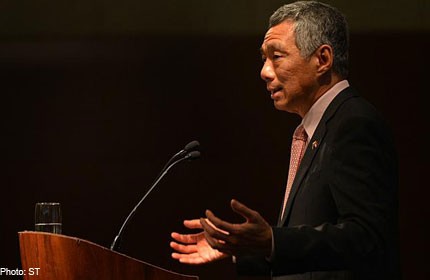PM outlines new approach for online engagement

Netizens who post on the website of the Government's feedback arm must register from next month, Prime Minister Lee Hsien Loong said on Friday.
The change comes as Singapore moves towards a framework to take "full advantage" of the new media environment, in the light of a strategic shift in how people consume news and the attendant problems that have arisen as a result of social media.
Studies have shown that the anonymity the Internet confers increases unethical behaviour and contempt, PM Lee pointed out, so new rules will widen the space for constructive discourse and participation online. They will also let different perspectives surface and not just those of a vocal minority; and protect users from those who abuse cyberspace.
The new media landscape is an indispensable part of citizens' lives, he said at a Lianhe Zaobao event for its 90th anniversary.
"We must do more to harness its potential to improve our lives, while reducing its downsides."
In his first major speech on the media since an address to the Harvard Club in 2004, he listed three problems countries are grappling with in the Internet age - hacking, cyber bullying and trolling.
Recounting how several Singapore websites had been breached in the past few weeks, he said that such acts are "not a prank" but a serious threat. Hackers can cause grave harm, especially if government services are shut down or a hospital's IT system crashes. Cyber bullying is another growing problem, and the issue plagues the young particularly.
Also unacceptable - trolling, where a debate online degenerates into harsh words being exchanged and hate-mongering, because users can hide behind fake names.
Such abuse is unacceptable in face-to-face interaction, and it should be the same for online discourse, Mr Lee said.
"Trolls deter serious readers from participating, and ruin the overall atmosphere in cyberspace," he added.
Singapore must fight back against this, he said. The move to require log-ins for users of the Reach site was decided in this context. The New York Times and YouTube require online users to log in before commenting. Others have banned comments.
Singapore, Mr Lee added, is in the midst of harmonising new media rules to bring them in line with those for mainstream media. Online news sites with a certain reach, for instance, will need to be licensed.
He was asked later for his thoughts on online sentiment that some recent policies have been "reactive".
The Government "cannot just react to online sentiments and decide, for example, that if people have said online that they don't like a particular policy, to just scrap it". It has to continue doing its job, he added, and try its best to communicate intentions so people understand what the Government is doing, and why.
To mistake views online as representative of the majority would lead to trouble, he replied.
To engage Singaporeans better, almost every ministry and MP has a Facebook account, he noted. "My recent post about a barn owl which flew into the Istana garnered 500,000 views within a day!"
He gave suggestions on how Lianhe Zaobao could continue to thrive, including how it must reflect diverse views objectively and responsibly.
limze@sph.com.sg
chinlian@sph.com.sg

Get a copy of The Straits Times or go to straitstimes.com for more stories.